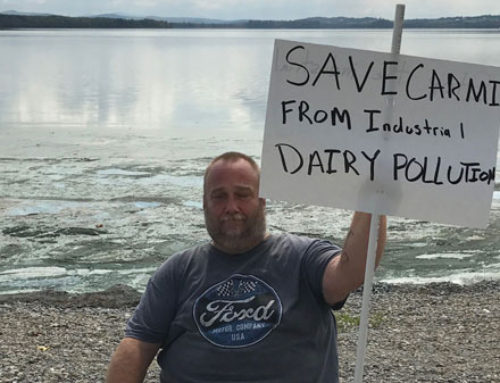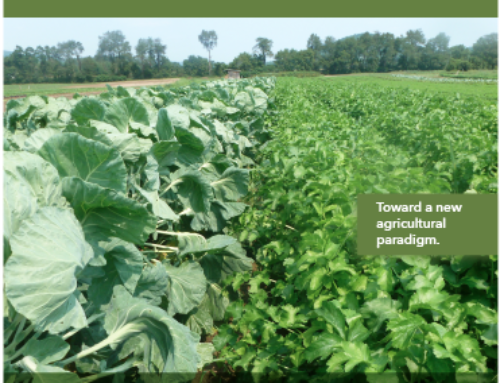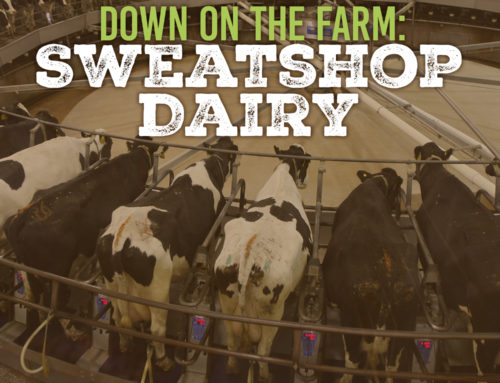
Blast from the Past: It was twenty years ago that we first published our warning to the organic farming community about the impending corporate takeover of its movement, beginning with federal standards that would, over time, weaken standards in service to the coming industrialism. The U.S. Department of Agriculture (USDA) wasn’t interested in the underlying social, cultural and political foundation of the organic food movement, we warned. The USDA was all about greasing the skids for Big Ag & Big Food, an increasingly homogenized set of corporations, to do what they do best: consolidate and monopolize. And so it went.
Below is an excerpted version of the original essay, “Beyond Organic: A Call for a New Food Movement,” that appeared in the Spring, 1998 issue of the Food & Water Journal. The author, Michael Colby, is the co-founder of Regeneration Vermont. The solutions we proposed then – go local and keep the movement in organics – are even more relevant (and necessary) today as they were twenty years ago.
Beyond Organic: A call for a new food movement.
The U.S Department of Agriculture’s (USDA) unseemly foray into the world of organic agriculture has one ultimate purpose: the further industrialization of organic agriculture. This USDA power-grab set off an unprecedented amount of hand-wringing in the safe food and sustainable agriculture communities that, unfortunately, focused almost exclusively on how to incrementally modify a set of standards that are rotten to the core. Lost amidst the flurry of “action alerts” was any contemplation of the fact that so much of the organic-related “movement” has been co-opted by traditional market forces and largely reduced to just another business in the nearly single-minded pursuit of profits.
From the beginning, going back to Senator Patrick Leahy’s original call for federal organic standards in 1990, Food & Water has been opposed to the very concept of adopting national standards for a form of agriculture that has long celebrated its decentralized roots in the local and regional. To attempt to apply a one-size-fits-all set of standards to a method of agriculture that strives to be sensitive to localized social and ecological conditions is misguided and absurd.
Ultimately, combating an industrial food supply—organic or not—is about challenging the anonymity of consumption.
With the very nature of these new standards being grounded in corporate attempts to nationalize, globalize, and centralize organic food production, they cannot be “fixed,” as so many people and organizations have mistakenly convinced themselves. Instead, we must seize this opportunity and the energy it has created to wholeheartedly reject the USDA’s corrupt and crippling organic standards and begin creating the vision for a new food movement that encompasses the social and ecological ideals that are forever beyond the grasp of federal bureaucracies.
Here Come the Feds.
To understand just how ridiculous the USDA’s meddling in organics actually is, you can wade through the massive tome of regulations, or, better yet, just consider what Secretary Dan Glickman of the USDA had to say before unveiling the new standards to the eager press corps: “I want to make it clear that these [organic] rules are not about creating a category of agriculture that is safer than any other.”
It doesn’t get any clearer than that.
As an agency that has had nothing but disdain for organic agriculture, the motives behind the USDA’s new commitment to getting its fingers in the organic pie and ensuring that its standards are as low as possible are obvious: to pave the way for the pure commodification and centralization of organics. As multinational agribusiness corporations increasingly seek an entry into the booming organic market, they need plenty of regulatory cover, particularly when they get around to “taking organics global.”
Many in the mainstream have deluded themselves into believing that such growth in the production and consumption of organic food products is nothing but positive, regardless of whether the results of such growth mean the same kind of industrialization and centralization that has been socially and ecologically unjust and destructive to rural cultures. Food & Water finds nothing redeeming in the fact that H.J Heinz now owns Earth’s Best Baby Foods, M&M-Mars owns Seeds of Change and Whole Foods is running roughshod over a once thriving food cooperative movement.
If the question is whether or not H.J Heinz, M&M-Mars, and Whole Foods should use toxic pesticides, the answer is obviously “no,” they should not. And if we had a federal government and a democracy that truly reflected the will of the people, policies outlawing the use of these insidious poisons would be in place.
Issues of scale, economic concentration, transportation, resource conservation, animal welfare, farmer and farmworker justice, and environmental stewardship, as well as a much needed emphasis on local production and consumption, must to the centerpieces of a real and politicized food movement.
But we must go deeper than that. In the pursuit of sane and sustainable food systems, we must take into account factors that go far beyond the simple list of which chemicals farmers can and cannot use in all fifty states. Rather, in addition to banning toxic pesticides, we must demand that our food supply does not become another weapon used for the benefit of multinational corporations against the best interests of individuals, communities, the land, and the environment. Issues of scale, economic concentration, transportation, resource conservation, animal welfare, farmer and farmworker justice, and environmental stewardship, as well as a much needed emphasis on local production and consumption, must be the centerpieces of a real and politicized food movement.
Unfortunately, the sad truth is that organic agriculture and the movement it spawned has been cleansed of many of their original radical roots and ideals in favor of being a mere business. “Is organics a movement or a business?” asked The Packer’s Larry Waterfield in an editorial shortly after the organic standards announcement. “Well, it used to be a movement toward environmentally friendly food production. Now it is a business.”
It doesn’t even help to contact the USDA and tell them to “get out” of organics; they don’t understand that language. The USDA is a bureaucracy that maintains its existence through such programs. At a gathering of organic farmers in Vermont last February, USDA officials heard hundreds of comments demanding that the USDA “get out” of organics. One of the USDA officials on hand, Grace Gershuny, the author of the first-draft of the standards, arrogantly responded in a newspaper article that “there were practically no helpful comments on anything” since “most of the comments focused on ‘we don’t want it, get rid of it,’ and are not substantive about what it should be.”
Creating the New Movement
The USDA is here to stay with organics and it appears from our perspective that we’re faced with two distinct possibilities: beg and whine for the standards to be a little bit better or get on with the necessary work of building real food security.
It seems obvious that when the ideals of a movement become the fodder for federal bureaucracies, it’s time to move on. When the so-called food revolution, formerly known as organic agriculture, becomes just another opportunity for economic expansion devoid of any of its political roots, it ceases to be a revolution. Just as the word “natural” has been so disturbingly devalued and rendered meaningless, “organic” is on the same path.
To adequately attack the industrialization of organic agriculture and begin re-envisioning the “next food movement,” we need to first abandon the notion that anything of substance can be accomplished through overly simplified actions. Calls to our legislators, letters to our federal agencies, and meetings with our representatives might make some of us feel warm and fuzzy about democracy’s theories, but, in the long run, it merely gives credibility to the corruption.
Simple actions inevitably lead to false solutions, as evidenced by the decades of foot-dragging and deceitful acts of Congress to address the problems of unnecessarily applying toxic pesticides to our food supply. Sure, the industrial-congressional partnership can point to laws with names like “The Food Quality Protection Act,” but what have they actually done besides distracting us all and giving corporate barons plenty of time to take their money and run?
We need to challenge basic assumptions of a purely market-based food system that is incapable of comprehending all of its destructive tendencies. A cheap organic carrot shipped in from South America may make a Vermont consumer feel pretty good about his or her own health, but what about related issues regarding scale, transportation, and resource conservation? And, if we’re at all serious about “saving the family farm,” shouldn’t we start by rooting our diets in the foods produced locally?
Ultimately, combating an industrial food supply—organic or not—is about challenging the anonymity of consumption, the destructive notion that suggest that we don’t have to care where anything came from or who produced it as long as it’s cheap and available. The more that we strive to shorten the distance between ourselves and our food supply, the less anonymous it becomes and the more direct accountability there is between producer and consumer.
The ultimate certifier for the manner in which food products are produced should not be a monolithic federal government, but rather a mutually trusting and celebrated relationship between the producer and the consumer, community, or, at the very least, local or regional certifiers with an understanding of localized, social, ecological and economic needs. In other words, what we should be striving for is assurance by familiarity.
No, these are not “simple” actions you can take. Producing your own food, getting “to know” your farmer, visiting farmers’ markets, being actively involved in meaningful food co-ops, or being diligent in shunning a monopolized food supply is certainly not easy. But it’s necessary if our goal is to not only fundamentally change a very destructive food system, but the underlying culture that makes it all possible.
— Michael Colby





